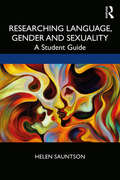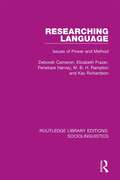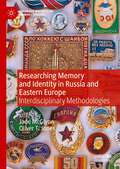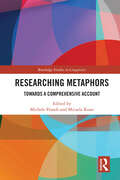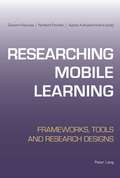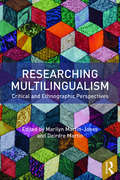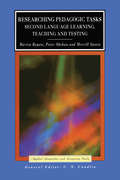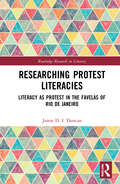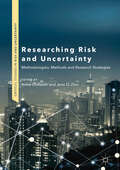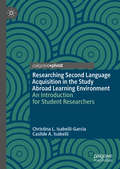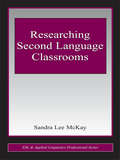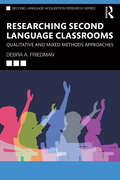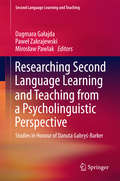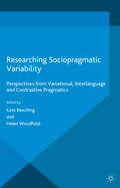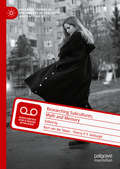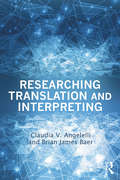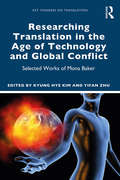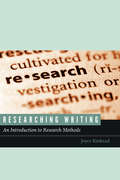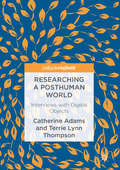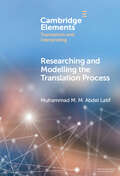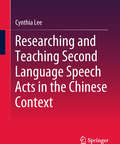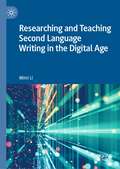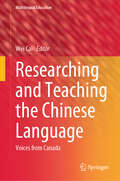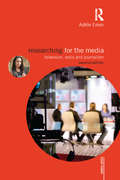- Table View
- List View
Researching Language, Gender and Sexuality: A Student Guide
by Helen SauntsonResearching Language, Gender and Sexuality leads students through the process of undertaking research in order to explore how gender and sexuality are represented and constructed through language. Drawing on international research, Sauntson incorporates a fluid understanding of genders and sexualities and includes research on a diverse range of identities. This accessible guidebook offers an outline of the practical steps and ethical guidelines involved when gathering linguistic data for the purpose of investigating gender and sexuality. Each chapter contains up-to-date information and empirical case studies that relate to a range of topics within the field of language, gender and sexuality, as well as suggestions for how students could practically research the areas covered. Student-friendly, this is essential reading for undergraduate and postgraduate students of English language, linguistics and gender studies.
Researching Language: Issues of Power and Method (Routledge Library Editions: Sociolinguistics)
by Deborah Cameron Kay Richardson Elizabeth Frazer Penelope Harvey M. B. RamptonOriginally published in 1992. This book discusses the possibilities of developing the research process in social science so that it benefits the subjects as well as the researcher. The authors distinguish between ‘ethical’, ‘advocate’ and ‘empowering’ approaches to the relationship between researcher and researched, linking these to different ideas about the nature of knowledge, action, language, and social relations. They then use a series of empirical case studies to explore the possibilities for ‘empowering research’. The book is the product of dialogue between researchers from a range of disciplines (anthropology, cultural studies, sociology and linguistics) and is for those working across the social sciences. Through combination of philosophical discussion, methodological recommendation and case-study illustration, it provides guidance that is practical without being simplistic.
Researching Memory and Identity in Russia and Eastern Europe: Interdisciplinary Methodologies (Palgrave Macmillan Memory Studies)
by Jade McGlynn Oliver T. JonesThis book offers a collection of innovative methodological approaches to Memory Studies in Russia and Eastern Europe. Providing insights into the relationship between memory and identity, the twelve chapters provide multidisciplinary analysis of how history is used to reinforce, remould, and reinvent national and group identities. This analysis includes a strong emphasis on interrogating the role of the researcher and the impact of methodology, exploring the field’s most pressing challenges, such as the subjectivity of remembrance, reception versus production of discourse, and the inclusion of marginal perspectives. By focussing on countries in which the past is highly politicised, including Serbia, Ukraine, Poland, Russia and the Baltic States, the volume also analyses the diverse – and often conflicting – ways in which historical narratives emerge from these states’ efforts to create new pasts that shape their respective visions of the future, with pressing ramifications across this region and beyond.
Researching Metaphors: Towards a Comprehensive Account (Routledge Studies in Linguistics)
by Michele Prandi Micaela RossiThis collection advocates for a more holistic picture of metaphor, extending the field’s focus beyond the cognitive paradigm and conventional metaphorical concepts to illustrate the possibilities afforded by the study of living metaphors. The volume brings together a diverse range of researchers in the discipline towards critically examining the presuppositions of the cognitive approach. The book shines a light on living metaphors – creative interpretations of conflictual meaning specific to a text or communicative act with their own unique functions – to throw into relief long-held tenets in existing metaphor research. Chapters reflect on the notion that creative metaphors spring from independent sources, not merely from metaphorical concepts, and the subsequent implications for our understanding of the relationship between linguistic forms and conceptual structures and the role of creative metaphors in organizing thought and action. Taken together, the book offers a complementary vision of languages and figures which integrates disparate lines of study within the cognitive paradigm with alternative perspectives for a more comprehensive portrait of metaphors. This book will be of interest to students and scholars interested in the study of metaphor, including such disciplines as theoretical linguistics, cognitive linguistics, semantics, literary studies, and philosophy of language.
Researching Metaphors: Towards a Comprehensive Account (Routledge Studies in Linguistics)
by Michele Prandi Micaela RossiThis collection advocates for a more holistic picture of metaphor, extending the field’s focus beyond the cognitive paradigm and conventional metaphorical concepts to illustrate the possibilities afforded by the study of living metaphors.The volume brings together a diverse range of researchers in the discipline towards critically examining the presuppositions of the cognitive approach. The book shines a light on living metaphors – creative interpretations of conflictual meaning specific to a text or communicative act with their own unique functions – to throw into relief long-held tenets in existing metaphor research. Chapters reflect on the notion that creative metaphors spring from independent sources, not merely from metaphorical concepts, and the subsequent implications for our understanding of the relationship between linguistic forms and conceptual structures and the role of creative metaphors in organizing thought and action. Taken together, the book offers a complementary vision of languages and figures which integrates disparate lines of study within the cognitive paradigm with alternative perspectives for a more comprehensive portrait of metaphors.This book will be of interest to students and scholars interested in the study of metaphor, including such disciplines as theoretical linguistics, cognitive linguistics, semantics, literary studies, and philosophy of language.
Researching Mobile Learning: Frameworks, Tools and Research Designs, Third Unrevised Edition
by Norbert Pachler Giasemi Vavoula Agnes Kukulska-HulmeThis book sets out the issues and requirements for mobile learning research, and presents recent efforts to specify appropriate theoretical frameworks, research methods and tools.
Researching Multilingualism: Critical and ethnographic perspectives
by Deirdre Martin Marilyn Martin-JonesResearching Multilingualism expertly engages with a new sociolinguistics of multilingualism, taking account of this new communicative order and the particular cultural and social conditions of our times. Seventeen chapters are divided into four sections covering: researching discourses, policies and practices; contemporary mobilities; Researching multilingual communication on-line; Multilingualism in research practice. This state-of-the-art overview of research methodologies in multilingual settings will be of interest for all students and researchers working in the area of multilingualism within Linguistics, Applied Linguistics, Education and Communication Studies.
Researching Pedagogic Tasks: Second Language Learning, Teaching, and Testing (Applied Linguistics and Language Study)
by Merrill Swain Martin Bygate Peter SkehanResearching Pedagogic Tasks brings together a series of empirical studies into the use of pedagogical tasks for second language learning, with a view to better understanding the structure of tasks, their impact on students, and their use by teachers. The volume starts with an introduction to the background and key issues in the topic area and is then organised into three sections: the first section focuses on the language and learning of students on tasks the second on the use of tasks in the language classroom the third on the use of tasks for language testing Each section begins with a succinct section introduction, and the volume concludes with an afterword relating the theme of the volume to issues in curriculum development. The chapters include both experimental and qualitative approaches to the topic, some providing original accounts of specific studies, others offering overviews of linked series of studies.
Researching Protest Literacies: Literacy as Protest in the Favelas of Rio de Janeiro (Routledge Research in Literacy)
by Jamie D. DuncanBy focusing on the textually mediated reactions of local residents, social movements, and media producers to policy changes implemented in the favelas of Rio de Janeiro, this book studies the development of literacy as a tool to mobilize, perform, and disseminate protest. Researching Protest Literacies presents a combination of ethnographic fieldwork and extensive archival research to analyse how traditional and technology-driven literacy practices informed a new cycle of social protest in favelas from 2006-2016. Chapters trace nuanced interactions, document changing power balances, and in doing so conceptualize five forms of literacy used to enact social change - campaigning literacies, memorial literacies, media-activist literacies, arts-activist literacies, and demonstration literacies. Building on these, the study posits protest literacies as a new way of researching the role of contemporary literacy in protest. This insightful monograph would be of interest to doctoral students, researchers, and scholars involved in the fields of literacy studies, arts education, and social movement studies, as well as those looking into research methods in education and international literacies more broadly.
Researching Risk and Uncertainty: Methodologies, Methods and Research Strategies (Critical Studies in Risk and Uncertainty)
by Jens O. Zinn Anna OlofssonUnderstanding and managing risk and uncertainty is a central task in contemporary societies characterised by rapid social, technological and environmental change. This book presents research approaches used by scholars who all share a passion to gain new insights in how individuals, organisations and societies approach uncertain futures and their potential dangers. The contributions illustrate the usefulness of particular methods and methodologies for researching risk in order to advance the understanding and management of social, technological and environmental challenges. With research strategies and approaches from sociology, psychology, history, linguistics, anthropology, and gender studies, Researching Risk and Uncertainty provides guidance and inspiration to students and scholars across a range of disciplines interested in risk, disaster and social crisis.
Researching Second Language Acquisition in the Study Abroad Learning Environment: An Introduction for Student Researchers
by Casilde A. Isabelli Christina L. Isabelli-GarcíaThis book is intended to introduce novice student researchers to second language acquisition in the study abroad learning environment. It reviews the existing literature and provides the emerging researcher an overview of the important factors to consider, informs them where to begin, and how to move forth an agenda for future research in this field. The book recognizes that aside from the academic advantages, study abroad programmes are an excellent tool for fostering extended and relevant interaction with native speakers. It provides reflection questions and activities, and guides the novice researcher in critically analysing existing research and to eventually carry out their own study. The book will be of use to beginning researchers who are new to linguistics in the areas of study abroad and second language acquisition.
Researching Second Language Classrooms
by Sandra Lee MckayThis text introduces teachers to research methods they can use to examine their own classrooms in order to become more effective teachers. Becoming familiar with classroom-based research methods not only enables teachers to do research in their own classrooms, it also provides a basis for assessing the findings of existing research. McKay emphasizes throughout that what a teacher chooses to examine will dictate which method is most effective. Each chapter includes activities to help readers apply the methods described in the chapter, often by analyzing research data.*Chapter I, Classroom Research, introduces the reader to major research purposes and research types as they relate to classroom research, the distinction between quantitative and qualitative research, the formulation of research questions and research designs, and ethical issues in research.*Chapter II, Researching Teachers and Learners, presents research methods that can be used to examine teachers' and learners' attitudes and behaviors: action research, survey research, interviews, verbal reports, diary studies, case studies, and ethnographies.*Chapter III, Researching Classroom Discourse, deals with methods that can be used to study the oral and written discourse of classrooms: interaction analysis, discourse analysis, text analysis, and ways to examine the social and political assumptions underlying the choice and presentation of content in second language teaching materials.*Chapter IV, Writing Research Reports, provides guidelines for both thesis writing and journal articles.Researching Second Language Classrooms is an ideal text for TESOL research methods courses and an essential resource for inservice teachers who wish to undertake classroom research.
Researching Second Language Classrooms: Qualitative and Mixed Methods Approaches (Second Language Acquisition Research Series)
by Debra A. FriedmanThis volume provides graduate students and experienced researchers with a comprehensive guide to applying qualitative and mixed methods in classroom-based research on second language learning and teaching.In addition to coverage of methods for collecting and analyzing data, Researching Second Language Classrooms offers in-depth discussions on a range of practical, theoretical, methodological, and ethical issues that can arise when conducting research in language classrooms. Throughout the volume, the emphasis on building both theoretical knowledge and practical skills helps to facilitate understanding of how qualitative and quantitative methods can complement each other. Each chapter includes examples drawn from a range of research settings as well as tasks for practicing data collection and analysis techniques, questions to prompt reflection, and suggestions for further reading.This book will serve as a valuable text for research methods courses as well as a resource for scholars and researchers of applied linguistics, SLA, and language learning and teaching.
Researching Second Language Learning and Teaching from a Psycholinguistic Perspective
by Mirosław Pawlak Dagmara Gałajda Paweł ZakrajewskiThis editedcollection explores the processes of secondlanguage learning and teaching from a psycholinguistic perspective. Authored by leading experts in the field, the book includes studies focusing on theoretical,empirical and practical aspects of second and foreign language education. PartOne offers contributionsdevoted to a range of learner-related factors, dealing with affective andcognitive variables, the process of reading and the acquisition of lexis. PartTwo brings together papers related to teacher awareness of second language instruction that focus on conversational styles, fostering interculturalpragmatics, teacher job satisfaction, the development of instructionalmaterials and challenges of teacher training in different contexts. It is of interest to researchers as well as graduate andpostgraduate students seeking fresh inspirations for their own empiricalinvestigations of the ways in which second and foreign languages are taught andlearned.
Researching Sociopragmatic Variability: Perspectives from Variational, Interlanguage and Contrastive Pragmatics
by Kate Beeching Helen WoodfieldResearching Sociopragmatic Variability showcases a range of research approaches to the study of speech acts and pragmatic markers across different languages and varieties of a language, investigating native and non-native usages and variation across gender, situation and addressee.
Researching Subcultures, Myth and Memory (Palgrave Studies in the History of Subcultures and Popular Music)
by Bart van der Steen Thierry P. F. VerburghThis book brings together contributions that analyse how subcultural myths develop and how they can be studied. Through critical engagement with (history) writing and other sources on subcultures by contemporaries, veterans, popular media and researchers, it aims to establish: how stories and histories of subcultures emerge and become canonized through the process of mythification; which developments and actors are crucial in this process; and finally how researchers like historians, sociologists, and anthropologists should deal with these myths and myth-making processes. By considering these issues and questions in relation to mythmaking, this book provides new insights on how to research the identity, history, and cultural memory of youth subcultures.
Researching Translation and Interpreting: A Call For Dialogue Between Research And Practice (American Translators Association Scholarly Monograph Ser. #Xiv)
by Brian James Baer Claudia V. AngelelliThis volume offers a comprehensive view of current research directions in Translation and Interpreting Studies, outlining the theoretical concepts underpinning that research and presenting detailed discussions of the various methods used. Organized around three factors that are responsible for shaping the study of translation and interpreting today—post-positivist theoretical approaches, developments in the language industry, and technological innovations—this volume is divided into three parts: Part I introduces the basic concepts organizing translation and interpreting research, such as the difference between qualitative and quantitative research, between product-oriented and process-oriented studies, and between prescriptive and descriptive approaches. Part II provides a theoretical mapping of current translation and interpreting research, covering the theories underlying the current conceptualization of translation and interpreting, from queer studies to cognitive science. Part III explores the key methodological approaches to research in Translation and Interpreting Studies, including corpus-based, longitudinal, observational, and ethnographic studies, as well as survey and focus group-based studies. The international range of contributors are all leading research experts who use the methodologies in their work. They present the research aims of these methods, offer sample research questions that can—and cannot—be addressed by these methods, and discuss modes of data collection and analysis. This is an essential reference for all advanced undergraduates, postgraduates, and researchers in Translation and Interpreting Studies.
Researching Translation in the Age of Technology and Global Conflict: Selected Works of Mona Baker (Key Thinkers on Translation)
by Kyung Hye Kim Yifan ZhuMona Baker is one of the leading figures in the development of translation studies as an academic discipline. This book brings together fifteen of her most influential articles, carefully selected and grouped under three main topics that represent her most enduring contributions to the field: corpus-based translation studies, translation as renarration and translators in society. These applications and approaches have been widely adopted by translation scholars around the globe. The first section showcases Baker’s pioneering work in introducing corpus linguistics methodologies to the field of translation studies, which established one of the fastest growing subfields in the discipline. The second section focuses on her application of narrative theory and the notion of framing to the study of translation and interpreting, and her contribution to demonstrating the various ways in which translators and interpreters intervene in the negotiation of social and political reality. The third and final section discusses the role of translators and interpreters as social and political activists who use their linguistic skills to empower voices made invisible by the global power of English and the politics of language. Tracing key moments in the development of translation studies as a discipline, and with a general introduction by Theo Hermans and section introductions by other scholars contextualising the work, this is essential reading for translation studies scholars, researchers and advanced students.
Researching Writing: An Introduction to Research Methods
by Joyce KinkeadResearching Writing is an accessible, informative textbook that teaches undergraduates how to conduct ethical, authentic research in writing studies. The book introduces students to the research approaches used most often and offers a course framework for professors creating or teaching research courses themselves. Author Joyce Kinkead lays out the research process, including finding and defining questions, planning, and starting the research. Expository content introduces the language and methods of writing research, and specific methods are demonstrated in published examples, illustrating student work using student work and showing that it is possible for students to join the scholarly conversation in writing studies. Other features include student activities, instructor resources, student resources, and links to external content on journal websites, digital publications, YouTube, and similar work. The first-ever textbook for research methods in writing studies for undergraduates, Researching Writing takes a hands-on approach that excites and engages students in the depth and complexities of research and will influence the creation of courses in new writing majors as the field continues to grow.
Researching a Posthuman World: Interviews with Digital Objects
by Catherine Adams Terrie Lynn ThompsonThis book provides a practical approach for applying posthumanist insights to qualitative research inquiry. Adams and Thompson invite readers to embrace their inner – and outer – cyborg as they consider how today’s professional practices and everyday ways of being are increasingly intertwined with digital technologies. Drawing on posthuman scholarship, the authors offer eight heuristics for “interviewing objects” in an effort to reveal the unique – and sometimes contradictory – contributions the digital is making to work, learning and living. The heuristics are drawn from Actor Network Theory, phenomenology, postphenomenology, critical media studies and related sociomaterial approaches. This text offers a theoretically informed yet practical approach for asking critical questions of digital and non-digital things in professional and personal spaces, and ultimately, for considering the ethical and political implications of a technology mediated world. A thought-provoking and innovative study, this book will be of great interest to scholars and researchers of technology studies, digital learning, and sociology.
Researching and Modelling the Translation Process (Elements in Translation and Interpreting)
by Muhammad M. LatifTranslation process research is almost four decades old. Translator cognition is one of the most complex translation research areas to study. This complexity stems mainly from the difficulties involved in collecting and analyzing translation process data. The Element reviews and discusses the developments in translation process research. Specifically, it highlights the key terms in translation process research, its data sources, the developments this area has witnessed in four decades, and the efforts made in modelling the translation process so far. The work also proposes a translation process model which shows the central role monitoring plays in managing other translation subprocesses and evaluating the information being processed. Based on the issues reviewed and discussed, it is concluded that translation process research is still maturing. Making further developments in this translation research area requires addressing some contextual and methodological gaps, and investigating particular neglected research dimensions.
Researching and Teaching Second Language Speech Acts in the Chinese Context
by Cynthia LeeThis book contributes to the literature of interlanguage pragmatics by building an interface between researching and teaching speech acts in the Chinese context. It is written for researchers, language educators, classroom teachers and readers who are interested in interlanguage pragmatics research, acquisition and teaching, with particular reference to speech acts performed by Chinese learners of English, and their relationships with the learners’ first language and cultural concepts. It provides a more advanced understanding of the production and development of speech acts of Chinese learners of English from the cross-linguistic, cross-cultural, L1 and L2 developmental perspectives, drawing on relevant second language acquisition theoretical frameworks. It also recommends research-informed pedagogies that are applicable to other learners of English.
Researching and Teaching Second Language Writing in the Digital Age
by Mimi LiThis book presents a comprehensive approach to issues related to researching and teaching second language (L2) writing in digital environments. In the digital age, new technologies have revolutionized the ways we communicate and construct knowledge, and have also reshaped the traditional notions of writing and literacy, posing new challenges and opportunities for L2 teachers and students. This book provides up-to-date coverage of the main areas of L2 writing and technology, including digital multimodal composing, computer-mediated collaborative writing, online teacher and peer feedback, automated writing evaluation, and corpus-based writing instruction. It synthesizes the relevant literature, analyzes theoretical perspectives, compiles relevant resources, and offers research and pedagogical recommendations to guide scholars in undertaking new L2 writing research and instructional practice in technologically-supported educational contexts. This book will be of relevance and interest to researchers, language teachers, and graduate students in applied linguistics and education.
Researching and Teaching the Chinese Language: Voices from Canada (Multilingual Education #47)
by Wei CaiThis book offers an in-depth exploration of the unique landscape of Chinese language learning and teaching in Canada. It is the first to highlight the distinctive features of Chinese language education in the country and to introduce the Canadian approach to teaching and researching Chinese language, termed the "Canadian school of Chinese education." This approach, largely unfamiliar to the global academic community, is illuminated in this book, filling a critical gap in the literature and providing a platform for Canadian voices and perspectives in the field. The book delves into original and under-investigated areas, addressing important issues in Chinese teaching and learning that require more sophisticated research approaches due to advancements in our understanding and the discovery of complex Chinese learner populations. Structured into four sections, the book offers an overview of Chinese language education in Canada, examines comparisons of learning conditions, explores interactive dynamics and communication strategies, and delves into social and cultural dimensions. This book will be invaluable to researchers, instructors, advanced-level undergraduate students, and graduate students in the field of Chinese language learning and teaching.
Researching for the Media: Television, Radio and Journalism (Media Skills)
by Adele EmmResearching for the Media: Television, Radio and Journalism is an essential guide to researching for the media industry. It explains the role of the researcher and journalist within radio, television and journalism exploring key areas of what to expect in the job. Researching for the Media: Television, Radio and Journalism offers advice and instruction on practical, ethical and legal issues which affect anyone working in these industries. Beginning with suggestions on how to think up ideas and how to devise treatments, through to general research methods and techniques and guidance on working on location at home and abroad, it uses real examples of good and bad practice from the industry. Written by an experienced researcher, writer and producer, Researching for the Media includes: Tips on finding contributors from contestants, experts and specialists through to audiences and celebrities How to find photographs, picture and film clips and the ethical and legal issues involved Advice on finding and using music and copyright issues How the media uses the internet and social media such as Twitter, Facebook, Instagram A discussion of risk assessment, codes of conduct, ethical behaviour and legal and safety issues A glossary of media terms, further reading and a list of helpful websites. Discover more at www.adeleemm.com
